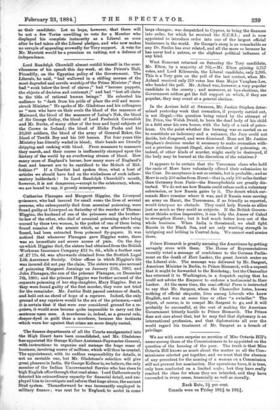,Catharine Flanagan and Margaret Higgins, the Liverpool :poisoners, who had
insured for small sums the lives of several persons, who subsequently died from arsenical poisoning, were 'found guilty at Liverpool on Saturday of the murder of Thomas 'Higgins, the husband of one of the prisoners and the brother- in-law of the other, who died of arsenical poisoning after being -nursed by these two women, in the pocket of one of them being found remains of the arsenic which, as was afterwards con- fessed, bad been extracted from poisoned fly-papers. It was noticed that whenever Flanagan gave Higgins water, there was an immediate and severe access of pain. On the day -nnwhich Higgins died, the sisters had obtained from the British Workman Insurance Company £12 9s. 6d., while a further sum .of £7 17s. 6d. was afterwards obtained from the Scottish Legal Life Assurance Society. Other offices in which Higgins's life was insured did not pay the claim. The sisters were also accused of poisoning Margaret Jennings on January 25th, 1883, and John Flanagan, the son of the prisoner Flanagan, on December 7th, 1880; and the prisoner Higgins was further accused of the separate poisoning of her step-daughter, Mary Higgins. But as they were found guilty of the first murder, they were not tried for the remainder. Mr. Justice Butt passed sentence of death, and held out no shred of hope of a reprieve. Indeed, the only ground of any reprieve would be the sex of the prisoners,—and it is certain that if that were ever considered ground for a re- .prieve, it would soon become quite impossible to carry out the sentence upon men. A murderess is, indeed, as a general rule, deeper-dyed in guilt than a murderer, because the instincts -which warn her against that crime are more deeply rooted.


































 Previous page
Previous page